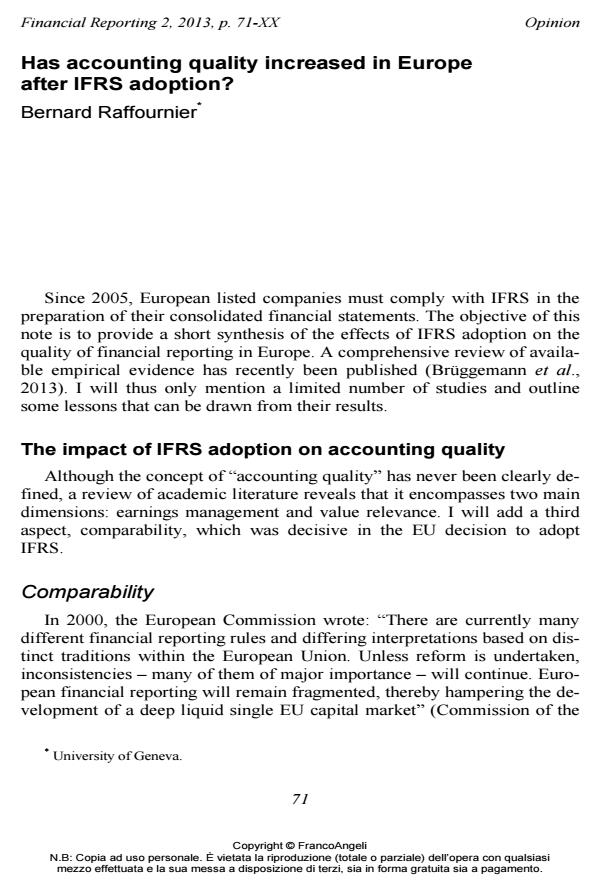Has accounting quality increased in Europe after IFRS adoption?
Titolo Rivista FINANCIAL REPORTING
Autori/Curatori Bernard Raffournier
Anno di pubblicazione 2013 Fascicolo 2013/2 Lingua Inglese
Numero pagine 8 P. 71-78 Dimensione file 578 KB
DOI 10.3280/FR2013-002005
Il DOI è il codice a barre della proprietà intellettuale: per saperne di più
clicca qui
Qui sotto puoi vedere in anteprima la prima pagina di questo articolo.
Se questo articolo ti interessa, lo puoi acquistare (e scaricare in formato pdf) seguendo le facili indicazioni per acquistare il download credit. Acquista Download Credits per scaricare questo Articolo in formato PDF

FrancoAngeli è membro della Publishers International Linking Association, Inc (PILA)associazione indipendente e non profit per facilitare (attraverso i servizi tecnologici implementati da CrossRef.org) l’accesso degli studiosi ai contenuti digitali nelle pubblicazioni professionali e scientifiche
- Aharony J., Barniv R., Falk H. (2010), The impact of mandatory IFRS adoption on equity valuation of accounting numbers for security investors in the EU, European Accounting Review, 19, pp. 535-578, DOI: 10.1080/09638180.2010.506285
- Ahmed A.S., Neel M., Wang D. (2013), Does mandatory adoption of IFRS improve accounting quality? Preliminary evidence, Contemporary Accounting Research, forthcoming, DOI: 10.1111/j.1911-3846.2012.01193.x
- Arya A., Glover J.C., Sunder S. (2003), Are unmanaged earnings always better for shareholders?, Accounting Horizons, Supplement, pp. 111-116, DOI: 10.2308/acch.2003.17.s-1.111
- Aubert F., Grudnitski G. (2011), The impact and importance of mandatory adoption of International Financial Reporting Standards in Europe, Journal of International Financial Management and Accounting, 22, pp. 1-26,
- 10.1111/j.1467-646X.2010.01043.x.
- Brüggemann U., Hitz J.-M., Sellhorn T. (2013), Intended and unintended consequences of mandatory IFRS adoption: A review of extant evidence and suggestions for future research, European Accounting Review, 22, pp. 1-37, DOI: 10.1080/09638180.2012.718487
- Callao S., Jarne J.I. (2010), Have IFRS affected earnings management in the European Union?, Accounting in Europe, 7, pp. 159-189, DOI: 10.1080/17449480.2010.511896
- Chen H., Tang Q., Jiang Y., Lin Z. (2010), The role of International Financial Reporting Standards in accounting quality: Evidence from the European Union, Journal of International Financial Management and Accounting, 21, pp. 220-278, DOI: 10.1111/j.1467-646X.2010.01041.x
- Chiapello E., Medjad K. (2009), An unprecedented privatisation of mandatory standard-setting: the case of European accounting policy, Critical Perspectives on Accounting, 20, pp. 448-468, DOI: 10.1016/j.cpa.2008.09.002
- Clarkson P., Hanna J.D., Richardson G.D., Thompson R. (2011), The impact of IFRS adoption on the value relevance of book value and earnings, Journal of Contemporary Accounting and Economics, 7, pp. 1-17, DOI: 10.1016/j.jcae.2011.03.001
- Commission of the European Communities (2000), Communication from the Commission to the Council and the European Parliament – EU financial reporting strategy: the way forward, Brussels, Commission of the European
- Communities. Devalle A., Onali E., Magarini R. (2010), Assessing the value relevance of accounting data after the introduction of IFRS in Europe, Journal of International Financial Management and Accounting, 21, pp. 85-119.
- Filip A., Raffournier B. (2010), The value relevance of earnings in a transition economy: The case of Romania, The International Journal of Accounting, 45,
- pp. 77-103, DOI: 10.1016/j.intacc.2010.01.004
- Glaum M., Schmidt P., Street D.L., Vogel S. (2013), Compliance with IFRS 3- and IAS 36-required disclosures across 17 European countries: company- and country-level determinants, Accounting and Business Research, 43, pp. 163-204, DOI: 10.1080/00014788.2012.711131
- Iatridis G., Rouvolis S. (2010), The post-adoption effects of the implementation of International Financial Reporting Standards in Greece, Journal of International Accounting, Auditing and Taxation, 19, pp. 55-65, DOI: 10.1016/j.intaccaudtax.2009.12.004
- Jeanjean T., Stolowy H. (2008), Do accounting standards matter? An exploratory analysis of earnings management before and after IFRS adoption, Journal of Accounting and Public Policy, 27, pp. 480-494, DOI: 10.1016/j.jaccpubpol.2008.09.008
- Jones S., Finley A. (2011), Have IFRS made a difference to intra-country financial reporting diversity?, The British Accounting Review,. 43, pp. 22-38, DOI: 10.1016/j.bar.2010.10.004
- Kvaal E., Nobes C. (2010), “International differences in IFRS policy choice: a research note”, Accounting and Business Research, 40, pp. 173-187, DOI: 10.1080/00014788.2010.9663390
- Kvaal E., Nobes C. (2012), “IFRS policy changes and the continuation of national patterns of IFRS practice”, European Accounting Review, 21, pp. 343-371, DOI: 10.1080/09638180.2011.611236
- Landsman W.R., Maydew E.L., Thornock J.R. (2012), “The information content of annual earnings announcements and mandatory adoption of IFRS”, Journal of Accounting and Economics, 53, pp. 34-54, DOI: 10.1016/j.jacceco.2011.04.002
- Paananen M., Lin H. (2009), The development of accounting quality of IAS and IFRS over time: The case of Germany, Journal of International Accounting Research, 8, pp. 31-55, DOI: 10.2308/jiar.2009.8.1.31
- Schipper K., Vincent L. (2003), Earnings quality, Accounting Horizons, supplement, pp. 97-110, DOI: 10.2308/acch.2003.17.s-1.97
- Verriest A., Gaeremynck A., Thornton D.B. (2013), The impact of corporate governance on IFRS adoption choices, European Accounting Review, 22, pp. 39-77, DOI: 10.1080/09638180.2011.644699
- Zéghal D., Chtourou S., Sellami Y.M. (2011), An analysis of the effect of mandatory adoption of IAS/IFRS on earnings management, Journal of International Accounting, Auditing and Taxation, 20, pp. 61-72, DOI: 10.1016/j.intaccaudtax.2011.06.001
- Impairment estimates for available-for-sale equity instruments under IFRS: evidence from italian Banks Giuseppe Sannino, Gianluca Ginesti, Carlo Drago, in FINANCIAL REPORTING 2/2015 pp.115
DOI: 10.3280/FR2014-002005 - Accounting discretion in family firms: The case of goodwill write-off. Evidence from US firms Giulio Greco, Lorenzo Neri, in FINANCIAL REPORTING 1/2021 pp.5
DOI: 10.3280/FR2021-001001 - Voluntary application of IFRS by unlisted companies: evidence from the Italian context Costanza Di Fabio, in International Journal of Disclosure and Governance /2018 pp.73
DOI: 10.1057/s41310-018-0037-z - Are tax incentives determinant and relevant for capitalizing R&D expenditures? Evidence from Europe Giuseppe Di Martino, Grazia Dicuonzo, Arcangelo Vitelli, Vittorio Dell’Atti, in FINANCIAL REPORTING 2/2020 pp.63
DOI: 10.3280/FR2020-002003 - The role of institutions in the process of global convergence to IFRS Roberto Aprile, Laura Bini, in FINANCIAL REPORTING 2/2018 pp.111
DOI: 10.3280/FR2018-002005
Bernard Raffournier, Has accounting quality increased in Europe after IFRS adoption? in "FINANCIAL REPORTING" 2/2013, pp 71-78, DOI: 10.3280/FR2013-002005